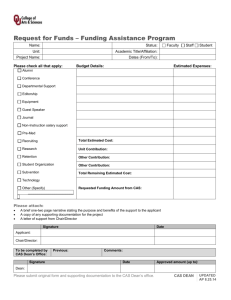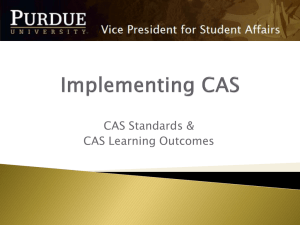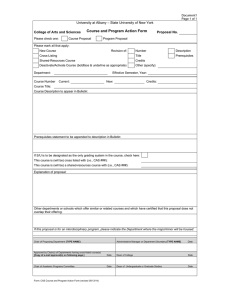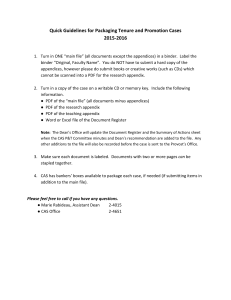College of Arts and Sciences Council of Chairs October 21, 2009
advertisement
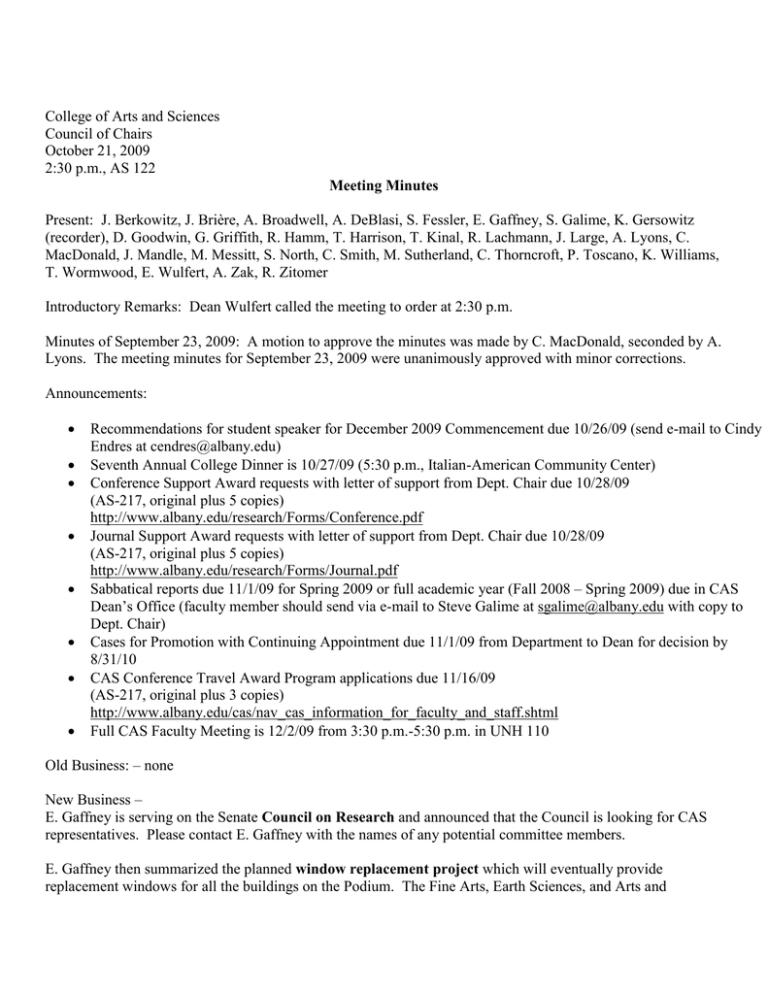
College of Arts and Sciences Council of Chairs October 21, 2009 2:30 p.m., AS 122 Meeting Minutes Present: J. Berkowitz, J. Brière, A. Broadwell, A. DeBlasi, S. Fessler, E. Gaffney, S. Galime, K. Gersowitz (recorder), D. Goodwin, G. Griffith, R. Hamm, T. Harrison, T. Kinal, R. Lachmann, J. Large, A. Lyons, C. MacDonald, J. Mandle, M. Messitt, S. North, C. Smith, M. Sutherland, C. Thorncroft, P. Toscano, K. Williams, T. Wormwood, E. Wulfert, A. Zak, R. Zitomer Introductory Remarks: Dean Wulfert called the meeting to order at 2:30 p.m. Minutes of September 23, 2009: A motion to approve the minutes was made by C. MacDonald, seconded by A. Lyons. The meeting minutes for September 23, 2009 were unanimously approved with minor corrections. Announcements: Recommendations for student speaker for December 2009 Commencement due 10/26/09 (send e-mail to Cindy Endres at cendres@albany.edu) Seventh Annual College Dinner is 10/27/09 (5:30 p.m., Italian-American Community Center) Conference Support Award requests with letter of support from Dept. Chair due 10/28/09 (AS-217, original plus 5 copies) http://www.albany.edu/research/Forms/Conference.pdf Journal Support Award requests with letter of support from Dept. Chair due 10/28/09 (AS-217, original plus 5 copies) http://www.albany.edu/research/Forms/Journal.pdf Sabbatical reports due 11/1/09 for Spring 2009 or full academic year (Fall 2008 – Spring 2009) due in CAS Dean’s Office (faculty member should send via e-mail to Steve Galime at sgalime@albany.edu with copy to Dept. Chair) Cases for Promotion with Continuing Appointment due 11/1/09 from Department to Dean for decision by 8/31/10 CAS Conference Travel Award Program applications due 11/16/09 (AS-217, original plus 3 copies) http://www.albany.edu/cas/nav_cas_information_for_faculty_and_staff.shtml Full CAS Faculty Meeting is 12/2/09 from 3:30 p.m.-5:30 p.m. in UNH 110 Old Business: – none New Business – E. Gaffney is serving on the Senate Council on Research and announced that the Council is looking for CAS representatives. Please contact E. Gaffney with the names of any potential committee members. E. Gaffney then summarized the planned window replacement project which will eventually provide replacement windows for all the buildings on the Podium. The Fine Arts, Earth Sciences, and Arts and Sciences buildings will be the first to receive the new windows. The project is too large to accomplish during the summer months alone and discussions are currently taking place to develop a plan that will minimize disruption and inconvenience. She noted that the new windows will be double paned and energy efficient and that new window treatments will also be installed. C. MacDonald noted that in her buildings the labs are extremely cold over the weekends and the building in general is very cold on Monday mornings. E. Gaffney noted that the heat is setback over the weekends. It was noted that a number of faculty and staff are finding the size of their Outlook mailboxes to be insufficient. Attachments fill the mailboxes very quickly. There are a number of strategies for managing this. University policy will allow for an additional 100MB for a fee of $50.00. Alternatively, personal folders can be stored on individual N drives. This will save space but may limit access from home. A. Lyons noted that she has a desktop interface that will allow her access to these files from home, however to do this the office computer must be left on. T. Wormwood noted that faculty can request an increase in the size of their mailbox. H. Strother and CAS Computing are available to work with individuals to solve these problems. The remainder of the meeting was devoted to a discussion of developing decision making criteria for faculty reinvestment. Dean Wulfert noted that this topic was suggested by one of the Chairs. Although there is no indication that funds will be available in the near future to reinvest, it is important to consider the parameters that will be used in future decision making. Dean Wulfert noted that the process we will use to develop criteria is similar to what the Provost has used in the Dean’s Council to establish principles for reinvestment. The Dean then referred to the data sent to the Chairs prior to the meeting including enrollments, faculty headcount, assistantship allocations, research applications and research awards. Dean Wulfert asked the Chairs what additional data they might need to review in developing reinvestment criteria. Enrollment Data: A. Broadwell noted that the figures for Linguistics and Human Biology appeared to be embedded in the Anthropology enrollment numbers. It was noted that this is an issue in a few areas as IRPE collapses program data within Departments. R. Hamm suggested that we also need to be able to look at the number of minors in each program and also the general education burden carried by the Department. This could be expressed in terms of the % of classes that are GenEd. It was noted however that in History, for example, at the 300-400 level, about 60-70% of classes count for GenEd, however, not all students are taking these classes just to fulfill GenEd requirements. J. Briere suggested we should also look at Student FTE/Faculty FTE. It was noted that the teaching assistants might skew this ratio. R. Zitomer noted that in addition to the GenEd load, in a number of Departments there are enrollments that are a result of another Department’s major. (e.g., Biology majors take classes in Physics, Chemistry, and Math). R. Lachmann added that students from outside the College, for example from the School of Business, also take up seats. Dean Wulfert noted that the advisement burden is determined by the number of majors and to a lesser extent, the number of minors, who must also be advised in the minor requirements. Faculty Headcount: It is apparent in looking at the numbers that we are on the downhill track in terms of total tenure track faculty lines. Dean Wulfert has used this data in making an argument to the administration that CAS needs more lines. She clarified that joint appointments are only counted in the home Department. R. Zitomer commented that too often the implications of an increased workload on CAS Departments are not considered when developing new programs. Dean Wulfert noted that this is true and that CAS participation in the Senate is essential if we want the opportunity to argue the College’s position and influence decisions. There was a discussion on whether or not it was appropriate to use a specific year as a baseline for comparisons or if other criteria should be used . If a Department loses a faculty member should they retain the line or should we look globally to see where we should reinvest? Dean Wulfert explained that in the past when a Department lost a faculty member, the line remained in the College and the Dean determined where it should be filled. Now, part of every line lost will go back to the Provost to allow her to accumulate enough funding to reinvest where she sees fit. J. Mandle noted that turnover resulting from a Department denying tenure to a faculty member should be considered differently than other turnover lines. In the past, the agreement with the Departments was that if this occurred, the line would remain in the Department. This was not the case if a decision not to tenure was made beyond the Department. Dean Wulfert noted that she would make the strongest case for this to continue, but in the long term, regardless of the ability to immediately rehire, it would be better for the Department to make the difficult decision not to tenure an individual who did not deserve tenure and backfill where necessary Discussion of criteria: We continue to work on the principle of investing to strength. Glyne Griffith warned that the criteria we develop now while in crisis mode may not be the same criteria we would use in good times. We should be careful not to root our decisions and strategies in crisis mode. J. Berkowitz noted that the work done by the Council on Academic Assessment (CAA) provides a useful body of information based on external reviewers who are respected voices in the field. This should be useful in getting the big picture. Universities are changing. We may see different relationships develop between Departments. How will our planning fit into the national discussion of these issues? C. MacDonald noted that CAS, and some Departments within CAS, have been hardest hit. She questioned whether it was necessary for Academic Affairs to shoulder so much of the burden of the budget cuts. Dean Wulfert noted that other SUNY centers have addressed the budget deficit in different ways. A. DeBlasi questioned how this activity would mesh with the University’s new strategic plan. Dean Wulfert noted that the CAS Strategic Plan ended in 2008 and that last year the Provost convened a working group to develop the Going Forward Plan. The University is currently beginning the process of developing a new strategic plan, as is the Chancellor for the SUNY system. T. Kinal noted that the College’s mission must be taken into consideration, particularly when we are operating in crisis mode. It was noted that research expenditures may provide a more accurate picture of research productivity in a Department as this is a better indication of ongoing activity. Only a small amount of indirect costs comes back to the College and Department. C. Thorncroft suggested we compare this return with other research universities. D. Goodwin confirmed that the indirect cost issue remains on the agenda for the Council for Research. Dean Wulfert stated that during the next Council of Chairs meeting we will continue this discussion by breaking up into disciplines to establish priorities. Adjournment: The meeting was adjourned at 4:05. Handouts: Agenda Minutes of September 23, 2009 Council of Chairs Meeting CAS Enrollments Summary of Faculty Headcount CAS Assistantship Allocations CAS Research Applications CAS Research Awards
